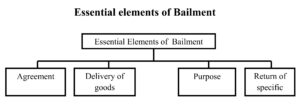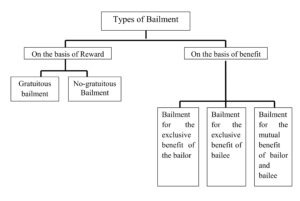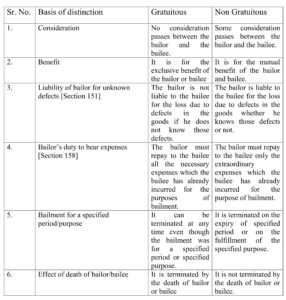Bailment
Bailment the world ‘bailment’ is derived from the French world the French world ‘baillier’ which means ‘to deliver Etymologically, it means any kind of handling over’. In legal sense, it involves change of possession of goods from one person to another for some specific purpose.
Definition of Bailment
Sec. 148 defines Bailment as” the delivery of goods by one person to another for some purpose, upon a contract, that they shall, when the purpose is accomplished, be returned or otherwise disposed of according to the directions of the person delivering them”. The person delivering the goods is called the ‘bailor’ and the person the person to whom they are delivered is called the ‘bailee’.
Consideration in a contract of bailment
In a contract of bailment, the consideration is generally in the form money payment either by the bailor or the bailee, as for example, when A gives his bicycle to B for repair, or when A gives his car to B on hire. Such consideration in money form, however, is not necessary to support the promise on the part of the bailee to return to goods. The detrainment suffered by the bailor, in parting with possession of the goods, is a sufficient consideration to support the contract of bailment.
1. Agreement
There must be an agreement between the bailor and the bailee.This agreement may be either express or implied.However,a bailment may be implied by law also. For example,bailment between a finder of goods and owner of goods.
2. Delivery of Goods
There must be delivery of goods.It means that the possession of goods must be transferred.In this this connection,The following points may be noted:
i. The delivery must be voluntary,for example the delivery of jewellery by its owner to a thief who shows a revolver,does not create a bailment because the delivery is not voluntary.
ii. Delivery may be actual or constructive.
3. Purpose
The delivery of goods must be for some intented purpose.For example,wrong delivery of goods to Jaipur Golden Roadways instead of Patel Roadways,does not create any bailment.
4. Return of specific Goods
The goods which form the subject matter of a bailment must be returned to the bailor or otherwise disposed off according to the directions of the bailor,after the accomplishment of purpose or after the expiry of period of the bailment.it may be noted that the same goods must be returned in their original form or desired.
Kinds/types of Bailment
i. On the basis of reward
a) Gratuitous Bailment
It is a contract of bailment where no consideration passes between the bailor and the bailee.
b) Non-gratuitous Bailment
It is a contract of bailment where some consideration passes between the bailor and the bailee.
Difference between Gratuitous bailment and non-gratuitous bailment
ii. On the basis of Benefit
a) Bailment for the exclusive benefit of the bailor
It is a contract of bailment which is executed only for the benefit of the bailor and the bailee does not derive any benefit from it.
b) Bailment for the exclusive benefit of the bailee
It is a contract of bailment which is executed only for the benefit of the bailee and the bailor does not derive any benefit from it.
c) Bailment for the mutual benefit
It is a contract of bailment which is executed for the mutual benefit of bailor and bailee.
DUTIES OF A BAILOR
- Duty to disclose defects [Section 151]
In case of gratuitous bailment:
The bailor must disclose all the defects in the goods-
- Which are known to him,and
- Which materially interfere with the use of them or expose the bailee to extraordinary risks.
In case of non gratuitous bailment
If the bailee suffers any loss due to any defect in the goods,the bailor is liable to bailee for such loss whether he knows those defects or not.
- Duty to bear expenses [Section 158]
In case of gratuitous bailment
The bailor must repay to the bailee all the necessary expenses which the bailee has already incurred for the purpose of bailment.
In case of non gratuitous bailment
The bailor must repay to the bailee all the extraordinary expenses which the bailee has incurred for the purpose of bailment.
- Duty to indemnity the bailee in case of premature termination of gratuitous bailment [Section 159]
A gratuitous bailment may be terminated by the bailor at anytime even though the bailment was for a specified time or purpose.The bailor must indemnify the bailee in case the loss arising due to premature termination of the bail,ment exceeds the benefits actually derived by the bailee.
- Duty to indemnity the bailee against the defective title of bailor [Section 164]
The bailor is responsible to the bailee for any loss which the bailee may suffer because of the defective title of the bailor.
- Duty to receive back the goods [Section 164]
The bailor must receive back the goods when the bailee,in accordance with the terms of bailment,returns the goods to him.If the bailor refuses to receive back the goods,he must repay to the bailee all the expenses which the bailee has incurred for the safe custody of goods.
- Duty to bear the risk of loss [Section 152]
The bailor must bear the risk of loss of goods provided the bailee has taken all responsible steps to protect the goods from loss.
DUTIES OF A BAILEE
- Duty to take care of the goods bailed [Section 151&152]
The bailee is bound to take as much care of the goods bailed to him as a man of ordinary prudence would,under similar circumstances take of his own goods of the same bulk,quality and value as the goods bailed.
- Duty not to make any unauthrosed use of goods [Section 154]
The bailee must use the goods bailed according to the conditions of the bailment.If he does not use the goods bailed according to the conditions of the bailment,he is liable to make compensation to the bailor for any damage arising to the goods from or during such use of them.
- Duty not to mix bailor‘s goods with his own goods [Section 155 to 157]
i. In case of mixture with bailor’s consent[Section 155]
The bailor and the bailee shall have an interest in proportion to their reppective shares in the mixture thus produced.
ii. In case of mixture without bailor’s consent when the goods can be separated[Section 156]
iii. In case of mixture without bailor’s consent when the goods cannot be separated[Section 157]
- Duty to return the goods [Section 160 & 161]
The bailee must return or deliver the goods according to the bailor’s directions without demand,after the accomplishmenmt of purpose or after the expiry of period of bailment.
- Duty to return accretion to the goods [Section 163]
In the absence of,any contract to the contrary,the bailee is bound to deliver to the bailor,or according to his directions,any increase or profit which may have accrued from the goods bailed.
- Duty not to set up any adverse title
The bailee must not do any act which is inconsistent with the title of the bailor.
Rights of a Bailor
- Right to claim damage in case of negligence [Section152]
If the bailee has not taken reasonable care or special care,the bailor has a right to claim damages for the loss,destruction or deterioration of the goods bailed.
- Right to terminate the contract in case of unauthorized use [Section 153]
If the bailee does any act in respect of goods bailed,which is inconsistent with the conditions of the bailment,the bailor has a right to terminate the contract of bailment.
- Right to claim compensation in case of unauthorized use [Section 154]
If the bailee doest not use the goods bailed according to the conditions of the bailment,the bailor has aright to claim compensation from bailee for any damage arising to the goods from or during such use of them.
- Right to claim the separation of goods in case of unauthorized mixture of goods [Section 156]
If the bailee,without the consent of the bailor mixes bailor’s goods with his own goods and the goods can be separated,the bailor has a right to claim his goods after separation.
- Right to claim compensation in case of unauthorized mixture of goods which canoot be separated[Section 157]
If the bailee,without the consent of the bailor mixes bailor’s goods with his own goods and the goods cannot be separated,the bailor has a right to claim compensation from bailee for the loss of the goods.
- Right to demand return of goods [Section 160]
The bailor has a right to demand return of goods after the accomplishment of the purpose or after the expiry of period of bailment.
- Right to claim compensation in case of unauthorized retention of goods [Section 161]
If the bailee does not return or deliver the goods according to the bailor’s directions after the accomplishment of purpose or after the expiry of period of bailment,the bailor has a right to claim compensation for any loss,destruction or deterioration of the goods from that time.
- Right to demand accretions to goods[Section 163]
In the absence of contract to the contrary,the bailor has a right to demand any increase or profit which may have accrued from the goods bailed.
RIGHTS OF A BAILEE
- Right to claim damage [Section 150]
In case of gratuitous bailment
If th ebailor does not disclose the defect in the goods which are known to him and the bailee suffers dome loss due to such defects,the bailee has a right to claim damages.
In case of non gratuitous bailment
If the bailee suffers any loss due to any defect in the goods,the bailee has a right to claim damages.
- Right to claim reimbursement of expenses [Section 158]
In case of gratuitous bailment
The bailee has a right to claim reimbursement of all the necessary expenses which he has already incurred for the purpose of bailment.
In case of non-gratuitous bailment
The bailee has a right to claim reimbursement of all the extraordinary expenses which the bailee has already incurred for the purpose of bailment.
- Right to be indemnified in case of premature termination of gratuitous bailment [Section 159]
Th ebailee has a right to be indemnified in case the loss arising due to premature termination of th egratuitous bailment exceeds the benefits actually derived by him.
- Right to recover loss in case of bailor‘s defective title [Section 164]
The bailee has a right to be indemnified in case he suffers any loss because of the defective title of the bailor.
- Right to recover loss in case of bailor‘s refusal to take the goods back [Section 164]
The bailor has a right to be indemnified in case he suffers any loss because of bailor’s refusal to take the goods back.
- Right to deliver goods to any one of the joint bailors [Section 165]
In the absence of any contract to the contrary,the bailee has a right to deliver back the goods to anyone of the joint owners or may deliver the goods back according to the directions of one joint owner without the consent of all.
- Right to deliver goods to bailor in case of bailor‘s defective title [Section 166]
If the bailor has no title to the goods,the bailee, in good faith,delivers them back to,or according to the directions of the bailor,the bailee is not responsible to the owner in respect of such delivery.
- Right to particulars lien [Section 170]
Where the bailee has,in accordance with the purpose of the bailment rendered any service involving the exercise of labour or skill in respect of the goods bailed,he has,in absence of a contract to the contrary,a right to retain such goods until he receives due remuneration for the services he has rendered in respect to them.
TERMINATION OF BAILMENT
I. Termination of every Contract of Bailment (whether Gratuitous or not)
Every contract of bailment comes to end under the following circumstances:
a) On the Expiry of Fixed Period
A bailment is terminated on the expiry of fixed period if the goods are bailed for a fixed period.
b) On fulfillment of the Purpose
A bailment is terminated on the fulfillment of the purpose if the goods are bailed for a specific purpose.
c) Inconsistent Use of Goods
A bailment may be terminated if the bailee does not use the goods according to the conditions of the bailment.
d) Destruction of the subject Matter of Bailment
A bailment is terminated if the subject matter of the bailment
- Is destroyed
- Becomes incapable of being used for bailment because of some change in the nature of goods.
II. Termination of Gratuitous Bailment
A contract of gratuitous bailment is terminated in the following circumstances also.
a) Before the Expiry of fixed Period
A gratuitous may be terminated by the bailor at any time even though the bailment was for a fixed period.However,the bailor is required to indemnify the bailee in case the loss due to premature termination exceeds the benefit actually derived by the bailee.
b) On Death of Bailor/Bailee
A gratuitous bailment is terminated by the death of either the bailor or bailee.




